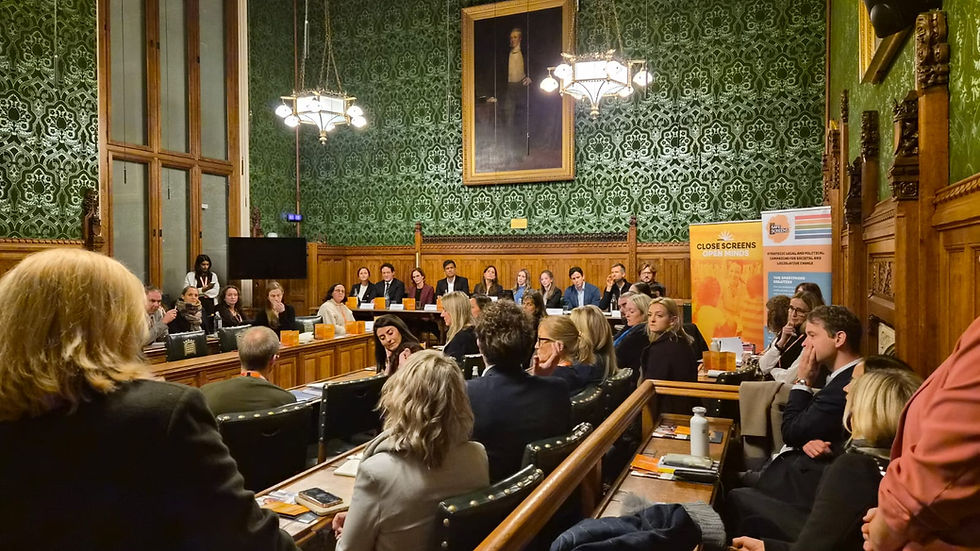#TechOnOurTerms – no more speculation, time for regulation
- velislava777
- Jul 28, 2023
- 4 min read
The claims of educational technologies are many: revolutionising learning, alleviating teachers’ from menial work to provide more time for teaching, ensuring equity and inclusivity, and transforming education for the better. On one level such claims are justified and the impact in many areas of education has certainly been positive. Yet giving EdTech companies unfettered entry to classrooms and letting them, in essence, access and gather up huge reams of data on our children, often without any clear oversight of how it has been used, an issue that has been overlooked for many years.

However, this week a major report by UNESCO’ Global Education Monitoring (GEM) Report – and one which I contributed too drawing on my research in this area – made the compelling case for why EdTech needs to be regulated.
“The digital revolution holds immeasurable potential but, just as warnings have been voiced for how it should be regulated in society, similar attention must be paid to the way it is used in education.” Said Audrey Azoulay, director-general of the UNESCO.
Specifically, the report said governments around the world must find a way to safeguard education’s future in children’s best interests – ideally through regulation.
The unbalanced focus on technologies
This call for greater oversight and regulation has been a long time coming and the report makes a compelling case.
The promise of digital technologies in education has driven governments to spend heavily and often inadequately for years, without looking closely at the potential risks, some of which are basic questions of lawfulness, safety and ethical standards.
For example, the digitalisation of education has led to the amassing of enormous amounts of sensitive student data, which can lead to unsupervised profiling, inferential and predictive analytics, normalisation of digital surveillance, and growing cybercrime.
Furthermore, the digitalisation of education has given the private tech sector a central role in public education. This shift leads to concerns around the corporatisation and commercialisation of education.
Part of this also concerns the harmful marketing discourse surrounding EdTech – the unverified promises and promotion of products as an automatic solution to educational challenges without thoroughly considering their fit, effectiveness or even basic things such as children’s basic human rights.
Given this then one of the key recommendations of the report is that the market needs to be scrutinised and regulated so there is greater understanding for schools on the product in the market they may choose to buy.
Globally, the report says, data protection legislation is nascent and needs to be improved. Beyond data accountability however, it also calls for the regulation of digital privacy, safety, and wellbeing (as screentime grows as a result of digitalising education).
“The right to education and the right to privacy need to be monitored and protected in a world where billions of people are connected and exchange data and information as they are learning,” the report says.
The report also calls for a shift in perspective, putting students back at the centre of their learning.
This would mean decisions about technology in education should prioritize students’ needs, and any EdTech must undergo rigorous assessments to ensure appropriateness, equity, evidence-based practices, sustainability as well as standards, legal and ethical compliance.
The report also recommends that governments “adopt and implement legislation, standards and agreed good practices” to protect students’ and teachers’ basic human rights, wellbeing, and safety, and ensure that the accumulated data over the course of a student’s learning is used in their best interests; to regulate the ethical use of advancing AI functionalities; to prevent digital surveillance and guard against commercialisation.
No country currently does such full assessment of their EdTech sector yet as the GEM report makes clear a push for regulation is gathering pace – and developments in this area could be arriving sooner rather than later.
Regulating the market of education technologies
One such area of development can be seen with the recent launch of the first EdTech Quality Framework, which I have also been involved in helping to create.
This framework has been developed over five years through work led by EdTech Impact, and its evaluation and research partners EDDS, the Education Alliance Finland, WikIT, and What Worked Education.
This is an industry-led drive designed to try and create a comprehensive evaluation and scrutiny of EdTech products and build an ecosystem of trust.
Until now, the risk for MATs and thousands of schools of bringing EdTech into their classrooms has hung over their heads, as there has been no independent evaluation system available to gauge the issues they face.
Now they can require EdTech tools to undergo independent rigorous evaluations of data privacy, algorithmic fairness, human rights, cybersecurity, pedagogic value, and appropriate designs, before they are deployed in the classroom.
With support from hundreds of schools and MATs, the Department for Education has been asked to pilot the new EdTech Quality Framework and to ensure that dedicated and systematic oversight is finally put in place in children’s best interests.
If they go ahead, that will be a first for any country and the UK will lead the way.
A version of this article first appeared in TES Magazine.



Comments